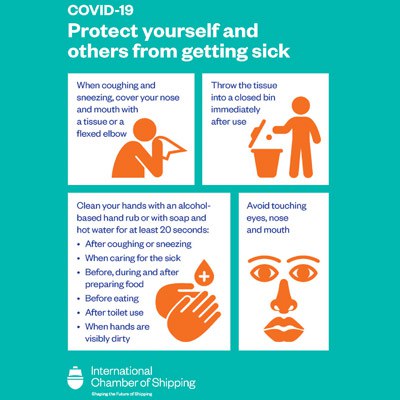COVID-19 Guidance updated
COVID-19, more commonly known as the coronavirus, has developed into a global pandemic. In order for maritime shipping to continue its operations, shipping companies should undertake measures to protect their members of crew and passengers. In the new guidance document "Coronavirus (COVID-19) - Guidance for Ship Operators for the Protection of the Health of Seafarers", the International Chamber of Shipping ICS explains the right protection measures for the novel coronavirus and how to react if a case of illness or a suspect case occurs on board.
In the guidance document, it is explained how seafarers should generally protect themselves preventatively, especially with hygienic preventative measures such as regular hand washing and the right conduct when coughing and sneezing (i.e. with a tissue or into the crook of the arm). Following the recommendation of the World Health Organization (WHO), ICS also assess that wearing masks on board in general should not be mandatory. Where it is not possible to keep the necessary distance, it is recommendatory however. The Guidance introduces different ways to create a mouth-nose cover yourself.
On their website and in Annex A, ICS provides posters that can be put up by ship operators on board their ships for information purposes for crew and passengers. The crew should be informed about how to deal with suspect and confirmed cases. A ship-specific outbreak management plan should be developed for concrete guidance of the crew. In addition, WHO developed a guide directed in particular at authorities dealing with COVID-19 outbreaks.

Additionally, the Guidance provides specific and important advice for persons responsible for medical care on board the ship. Personal protection with suitable protective equipment, effective isolation and disinfection as well as competent care of the patients should all be equally ensured.
The Guidance identifies three groups in relation to containing the outbreak potential: confirmed cases, suspect cases and people who have been in close contact to confirmed or suspect cases. Any suspect case has to be reported by the master to the next port of call. The virus has to be verified by a laboratory. The subsequent measures are given in the Guidance.
Prior to any persons entering the ship, their health condition needs to be checked. The questionnaire in Annex C can be used for this. The Guidance discusses the pros and cons of tests prior to boarding. The so called Shipboard Self-Distancing for the first 14 days on board is recommended and explained.
Despite the current and ongoing precautionary measures, there may be entry restrictions in ports, restrictions on crew changes and cargo operations or general delays. The Guidance also addresses this issue. A link to a regularly updated map on current port restriction is provided. A new Annex outlines under which conditions seafarers can obtain their personal prescriptions in the different countries and what needs to be done in advance to ensure that medication reaches the ship.
Worries about family, other crew members and oneself can have serious affects on the mental health of seafarers. Impeded crew changes and extension of service times on board for several months add to this. Every person deals differently with stress, isolation and emotions like fear, anxiety and worry. The guidance discusses thoroughly what can be done to deal with difficult moments and develop uplifting behaviour.


